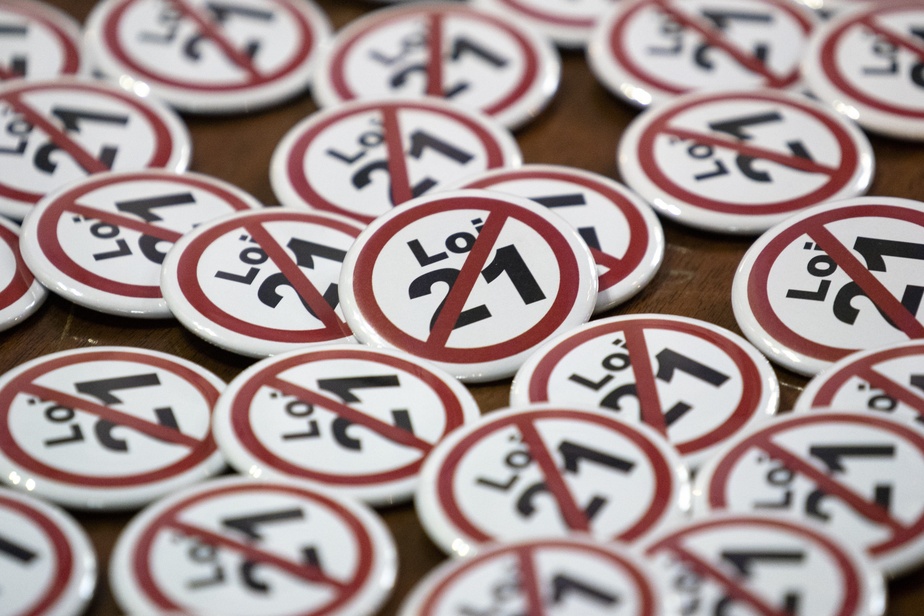On Friday, January 17, SSMU External Affairs and the Education Undergraduate Society of McGill joined various Montreal university organizations in a large demonstration expressing opposition to Bill 21. The demonstration began with a rally on McTavish featuring activists speaking out against the bill, followed by a long street protest culminating outside the Ministry of Immigration, which was joined by hundreds of McGill students.
Bill 21, first enacted in June 2019, bans religious symbols such as hijabs, turbans, kippah, and crucifixes for public service employees in positions of power, including teachers, judges, police officers, and certain lawyers. However, some argue that the bill has affected Muslim women wearing scarves or veils the most, placing Bill 21 at the heart of the debate over xenophobia in Quebec, one exacerbated by the populist centre-right Coalition Avenir Quebec (CAQ) victory in October 2018.
Demonstrators targeted additional policies that they viewed as resulting from populism, hatred, and fear-mongering, chanting “say no to racism,” and “say yes to refugees.” This rhetoric likely references the CAQ’s provision requiring new immigrants to undergo a “values test.” Pointedly, the march ended at Quebec’s Ministry of Immigration, Diversity, and Inclusion, which recently underwent a name change to the Ministry of Immigration, Francisation, and Integration.
Protestors urged university administrations to use their significant political sway to come out ‘strongly against the bill and in support of their students.’
Additionally, the Faculty of Education voted for a two-day strike, which occurred on Friday, January 17, and Monday, January 20. Students picketted in front of the Education Building to inform students about Bill 21 and encourage students to skip classes, in light of how Education students, in particular, are affected by the policy. CTV News Montreal reported that some McGill professors announced that they would not be taking attendance on Friday.
VP External Affairs Adam Gwiazda-Amsel, one of the protest leaders, elaborated that the main demand of the strike was for the CAQ to “repeal the law in its entirety.” Additionally, protestors urged university administrations to use their significant political sway to come out “strongly against the bill and in support of their students.”
He urged McGill to respond to student frustrations over the Bill by sending out a new mass email correcting a previous one on June 18, which states that “the law will not change our policies and practices,” which Gwiazda-Amsel interpreted as implying that “the Bill doesn’t really affect our students.” He argues that racialized students, even those who don’t wear religious symbols, are “being told that they don’t belong in Quebec.”
Additionally, the bill disproportionately affects students in the Faculty of Education and Law, many of whom will not be able to work in the Quebec public sector upon graduation. Gwiazda-Amsel explained that the ban on religious symbols for those in “positions of authority” expands very broadly to include, for example, police officers and Hydro Quebec employees. Many of these people cannot abide by the Bill while keeping in good faith with their religion, who, Gwiazda-Amsel argues, are told that “they have to look like a Quebecer” to integrate into the province.
Gwiazda-Amsel urged students to ‘take the proper time to understand the complexities of the issue.’
Gwiazda-Amsel said that the strike was also intended to “start a conversation” amongst faculty associations to determine what services McGill faculties should provide to community members affected by Bill 21. According to Gwiazda-Amsel, these services could include panels, discussion groups, support groups, and general assemblies. He argued that these were crucial for Quebec universities to show their support for students affected by the policy. Gwiazda-Amsel also asked that the university “take a leadership role” in portioning resources to information sessions to ensure that international students without the Quebec context are familiar with Bill 21.
Gwiazda-Amsel pointed to McGill’s response after the devastating Flight 752 crash, when those affected by the incident could be fast-tracked into the McGill Wellness Hub, as an example of McGill offering adequate services. In regards to the populations affected disproportionately by the bill, he suggested that many “cannot afford to go through the first-come first-served basis,” as they may have additional wellness resource needs.
To those who wish to learn more about Bill 21 resistance efforts, Gwiazda-Amsel pointed students to the McGill Against Bill 21 Facebook group, or the Political Campaigns department of SSMU. Interested students are advised to lobby their Faculty associations to provide resources for affected students, respectfully reach out to affected students directly, or contact community organizations like Justice Femme or the National Council of Canadian Muslims. Overall, Gwiazda-Amsel urged students to “take the proper time to understand the complexities of the issue,” especially in how public opinion has been shaped: 64% of Quebecers approve of Bill 21 as of July 2019.


